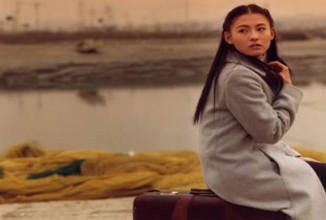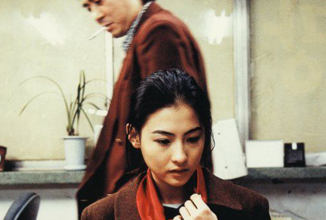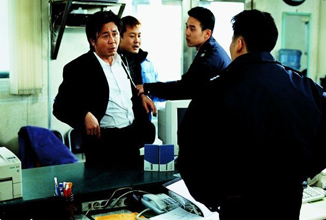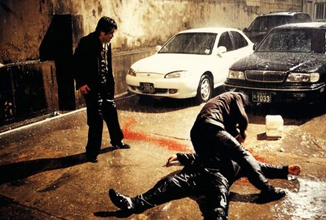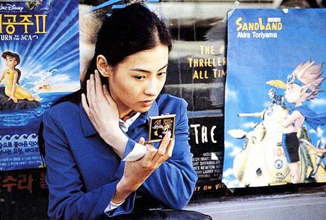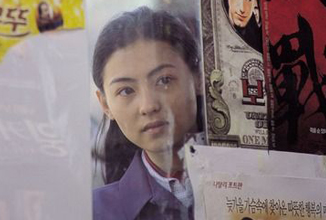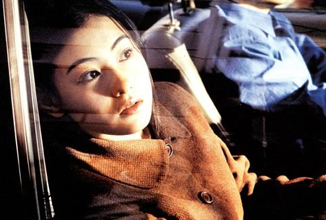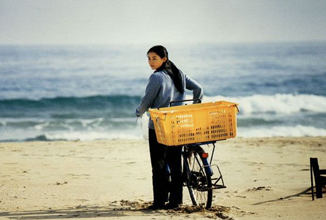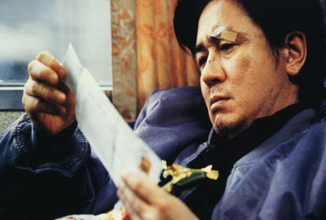
 |
||||||||||
Using a romance as the subject for a film is laden with possible pitfalls for any film maker - push the sentimentality a millimetre too far and it veers off into melodrama, don't push it far enough and any passion in the story is dulled. As if that wasn't enough to make any writer or director wary the vast majority of romantic films also tend to be based around one of three or so cliché-ridden plotlines:
The film begins with a young woman, whom we come to learn is the titular Failan (Cecilia Cheung), arriving in South Korea and queuing to have her passport stamped. The scene, filmed in black and white, lasts little over a minute and is all we see of Failan for the first half hour of the movie. Immediately following this short scene the story shifts to one year later and we are introduced to Kang-jae (Choi Min-sik), a two bit gangster whose biggest problem is that he's a bit too soft and, more often than not, a bit too drunk to be any good at his chosen career. Kang-jae has watched his one time friend Young-sik rise through the ranks of the gang which they both belong to, eventually becoming the boss, while Kang-jae has remained a minion who can’t even get any respect from the younger, junior members of the group. When Young-sik takes the beating of a rival gang member too far and kills the youth he puts a proposition to Kang-jae - if he'll take the fall for the killing and do the ten year jail time Young-sik will give him enough money to return to his home town on his release from prison and buy a fishing boat. At the end of yet another drunken night on the town Kang-jae phones Young-sik and agrees to his proposition but the next morning, as he is about to leave for the police station to hand himself in, the police arrive at his front door and inform him that his wife, Kang Failan, has died.
Failan's story:
Throughout the movie the prevalent feeling is that both characters have, admittedly for different reasons, no control over where their lives are leading them with both feeling deeply unhappy and alone, watching themselves spiraling downward. Failan really has no-one and, being desperate to share her love before she dies, subconsciously creates an imagined persona for Kang-jae based simply on the fact that he is smiling in the one photo she has of him and the kindness she feels he showed by marrying her. Kang-jae, on the surface at least, is nothing like the person Failan imagines him to be but is so used to being verbally abused and berated that her gratitude in the first letter comes to mean the same to him as his actions have meant to her. By the time he reads the second letter he has fallen in love, her unshakeable belief that he is a good person giving him hope that he may not be as worthless as everyone else thinks he is. Though the two characters never meet they each provide exactly what the other is missing, essentially completing each other and that is as close to a definition of soul mates as you can get.
Cast: Failan is played by Chinese actress Cecelia Cheung whose inability to speak all but the most basic Korean actually works in the film's favour, increasing the feeling that she is alone, alienated and unable to be understood. Cecelia brings a gentle humility to the character and gives an impassioned performance of a sad, lonely woman who is desperately trying to find her place in a country, a world and a life which she knows she is only visiting for a short time. With much less time on screen than her main co-star she still succeeds in showing us a detailed picture of Failan to the extent that by the end of the film viewers really are mourning her passing. Choi Min-sik (who also starred in Park Chan-wook's masterpiece Oldboy) gives an almost faultless performance as Kang-jae and the way in which his quite subtle portrayal shows the subconscious changes that the character goes through is remarkable. The rest of the cast play much smaller supporting roles but all perform admirably. Director Song Hae-sung refrains from ever portraying Failan as a character to be pitied - though we do see her crying it is always as a result of her day-to-day circumstances or her loneliness and is never related to being aware that she is dying. Even when she is shown writing the second letter to Kang-jae, posthumously (from his point of view) informing him of her terminal condition, and is clearly weighed down with sadness she still manages to deal with the issue with dignity and grace. Song Hae-sung wisely leaves the true grieving of Failan's passing to those she leaves behind and sets such a perfect tone that viewers can't help but feel that they are part of that group. Allowing viewer feelings to be moulded by character empathy and not by endless weepy dialogue is something which South Korean film makers are masters of but which Hollywood never seems willing to allow or able to achieve. With less competent direction Failan could easily have become a "weepy of the week" TV movie rather than the tour de force it is.
In every aspect Failan is a ground breaking film imaginatively conceived and expertly executed. Hollywood could never succeed in making a film which breaks your heart the way Failan does and let’s hope it never tries.
Actors: Cecilia Cheung, Choi Min-sik, Kong Hyeong-jin, Son Byung-ho, Jeong Dae-Hoon
DVD
|
||||||||||
All images © Tube Entertainment and Premier Entertainment Review © P. Quinn |
||||||||||
